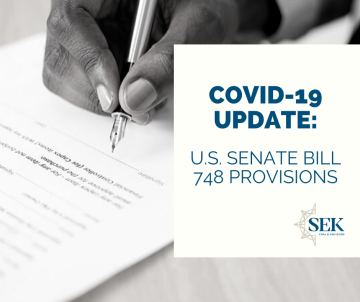Recent News & Blog / US Senate Bill 748: Employee Retention Credit and Delay in Employer Payroll Taxes

March 27, 2020
Employee Retention Credit for Employers Subject to Closures Due to COVID-19
A tax credit equal to 50% of wages paid to employees (up to $10,000 per employee) from March 12, 2020 to December 31, 2020, if business operations are fully or partially shutdown due to a government order, or if a business saw a reduction greater than 50% of gross receipts in any quarter in 2020 compared to the same quarter in the previous year. Wages would remain eligible until the government order is lifted, or gross receipts for a quarter increase to greater than 80% of gross receipts from the same quarter in the prior year.
If an employer has over 100 full time equivalent employees – wages are only eligible for employees being paid but not providing services.
If an employer has less than 100 full time equivalent employees – wages are eligible during a government ordered suspension period or for any quarter where gross receipts meet the reduction criteria.
The tax credit is taken against the employer portion of social security taxes for each quarter. Any credit in excess of the employment taxes will be treated as an overpayment and may be refunded.
Tax exempt organizations – applies to all operations whether partial or full suspension of operations.
Wages used to claim credits under the FFCRA paid leave and sick leave, and credits under Section 45S for paid family and medical leave do not qualify.
Qualified wages paid or incurred by employer can’t exceed the amount an employee would have been paid for working an equivalent duration during the preceding 30 days.
Qualified wages may include amounts paid or incurred by the employer to provide and maintain a group health plan, but only to the extent the amounts are excluded from gross income of employees. Qualified health plan expenses will be allocated to qualified wages on a pro-rata basis among employees and on a pro-rata basis of periods of coverage unless guidance is issued by the IRS.
Employers who take advantage of a small business interruption loan are not eligible for this retention credit.
Delay of Employer Payroll Taxes
Payroll tax deposits for the employer portion of social security taxes from the date of enactment through December 31, 2020, will be considered timely made if 50% is paid by December 31, 2021 and the other 50% is paid by December 31, 2022.
Self-employed individuals are subject to the same relief for the same period on their self-employment tax due, including amounts due with quarterly estimated tax payments.
Employers who receive loan forgiveness under the CARES Act are not eligible for this retention credit.